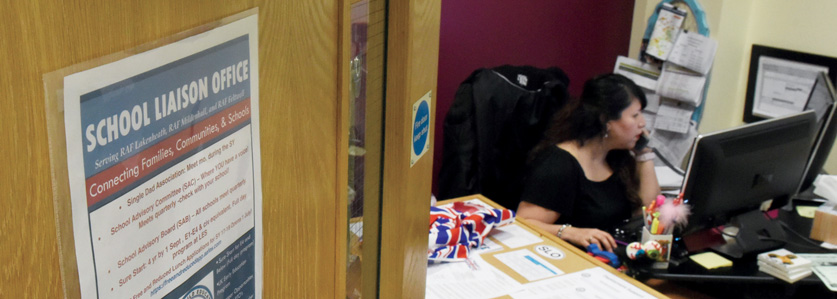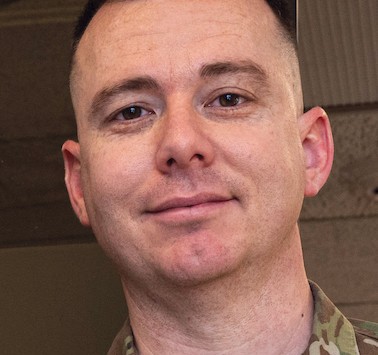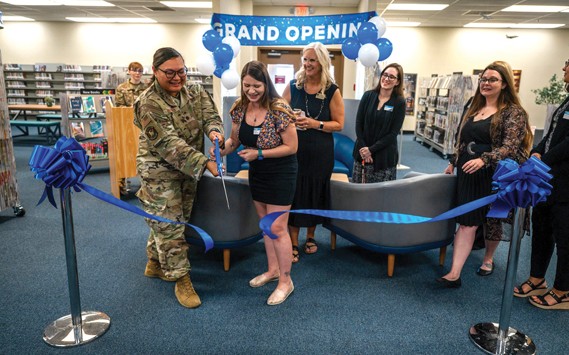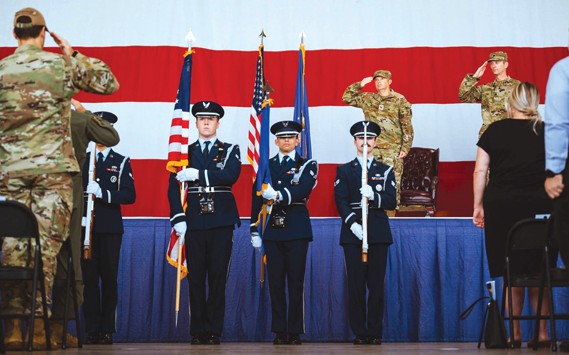Military kids around the world are going back to school after summer break with many experiencing not only new teachers but new surroundings, new schools and new friends as well.
Following a busy summer permanent-change-of-station season, Department of the Air Force School Liaison Program managers are helping ease the burden for families transitioning from one installation to another.
“The SLP managers assist with any educational concerns or challenges a family has and helps them navigate the school system and local community,” said Lori Phipps, the Department of the Air Force School Liaison Program manager at the Air Force Services Center. “They have their pulse on pre-kindergarten to 12th grade education in the local community and education services for families, educators and community stakeholders.”
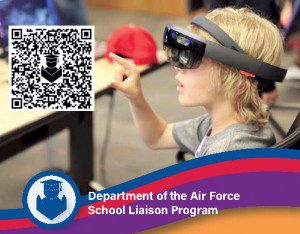
K-12 education is one of the pillars of the Five & Thrive initiative began in 2021 by Sharene Brown, spouse of Chief of Staff of the Air Force to increase focus and attention on the top five quality of life challenges faced by military families.
“With education being a quality-of-life priority for our members, families and most importantly our military-connected students, having a SLP says to our families that education is important,” said Lacey Allen, school liaison at Hurlburt Field, Florida. “The program is part of our commitment to you that we will continue to advocate, support and prioritize pre-K-12 education.”
There are more than 90 SLP managers at installations across the DAF with each responsible for all students, including those geographically dispersed but assigned to the installation.
With a focus on the three main objectives – advising command teams and helping drive change in the community; serving as ambassadors and building partnerships; and advocating for the needs of military connected students, the diversity of the program is equal to the diversity of challenges faced by military families.
“Every family and every issue are unique, and transitions are hard,” said Allen, “but they can be even harder for a military-connected student with varying educational factors such as transitioning for their senior year in high school. Can you imagine?”
For example, prior to their arrival, Allen was able to help a student by immediately connecting them and their family to their inbound school to begin reviewing transcripts. Since each state has different graduation requirements, transitioning during senior year can impact an on-time graduation.
“We were also able to educate the school and the family on the Military Interstate Children’s Compact (MIC3), which provides the opportunity to accept similar course work that was completed at the previous school,” she said.
Additionally, the student, who was also an athlete, missed tryouts so Allen connected the parent to the school administration so their student could tryout under the provision of the MIC3.
When a high school student from Stavanger, Norway, transferred to a school in a different country, they were told they would lose GPA points and class credits. That’s when Faith Madsen, SLP manager in Stavanger, went to work for the family.
“I mobilized partnerships I had established at our local school and brought the high school counselor, principal and other stakeholders together to communicate the GPA transferability and class credits so they could understand the system accurately,” she said.
By getting the student’s educational records and grades validated by the new location, Madsen was able to get the student full credit with correct GPA transferability.
“What started with a student being told to repeat classes and losing valuable GPA points, ended with full class credits awarded and the earned GPA accurately reflected on the student’s transcript,” she said.
“As school liaisons, we understand that families don’t want their military service to have a negative impact on their student’s educational experiences,” Allen said.
Although the SLP may be busier during the peak PCS season, Phipps and the school liaisons at installations are quick to point out that the program is critical year-round.
Through strong education-community partnerships, SLs are a “strong voice” for military families in the areas of legislation advocacy, policy review, joint service education initiatives, scholarship and grant resources, Impact Aid and the Military Family Life Counseling Program, Phipps said.
They also oversee MIC3 compliance, monitor compliance with public laws mandating education and related services for military populations, and advocate on behalf of military students on various boards, networks, and committees at the local and national levels.
For leadership teams at installations, SLs are there to help increase readiness, support retention and sustain the mission with deployment, homeschool and transition support for families. SLs are also up to date on local laws and policies to help families understand school choices and even assist with higher-education options like Junior ROTC, internships and mentoring opportunities.
“Our school liaisons continually collaborate with installation and community partners to identify educational opportunities, communicate them to families and assist to resolve issues if they arise,” Phipps said.
“It’s an integral part of fulfilling the AFSVC’s mission of delivering services, programs and activities to build and sustain ready and resilient Airmen, Guardians and families,” said Madsen, “and provides connectivity and consistency for our families.”
“Our SLs support transitioning military families from all branches of the military using a purple community capacity model which integrates the installation, school, and community. Regardless of where a family goes, there will always be a school liaison available to take care of them.
“Even if a family isn’t located on an installation, that military connected family is covered by the School Liaison Program,” Phipps said.
Stacey Holland is the SLP manager for the 56th Fighter Wing at Luke Air Force Base, Arizona. With 30 years of experience as an Air Force and civilian educator, she is familiar with many resources available to military families.
“I work hard to advocate for our military-connected students in our community,” said Holland. “I help to ensure that transitions are as smooth as possible by providing resources to inbound and outbound families. I also provide professional development to the local education agencies specifically on servicing military students and help incorporate programs such as ‘Student to Student’ and ‘Anchored For Life’ in our heavily military connected schools.”
Another key component of Holland’s role is ensuring that the Military Interstate Compact is enforced throughout the state, while addressing challenges that families and students may encounter in schools.
“I’m a member of the Community Action Team,” said Holland. “I continuously provide updates on education in the State of Arizona to the community, families, and wing leadership.”
Holland also provides workshops for families in areas such as career and college readiness, homeschooling, preparing for kindergarten, the Military Interstate Compact, and STEM.
For more information on the DAF SLP, visit www.dafchildandyouth.com/school-liaison-program. Holland is available at 623-856-6378, or email stacey.holland.1@luke.af.mil.
(Editor’s Note: School liaisons serve all Department of Defense ID cardholders to include civilians, retirees, Guard and Reserve, National Oceanic and Atmospheric Administration, U.S. Public Health Service, Foreign National Training Students, employees, and eligible family members.)






